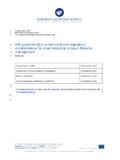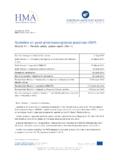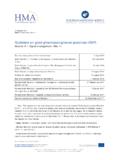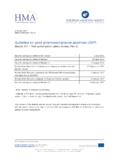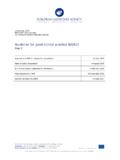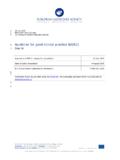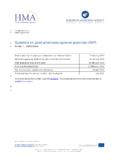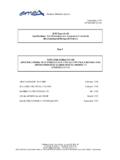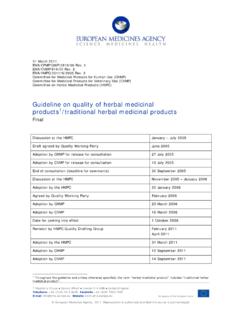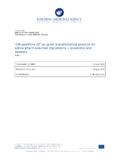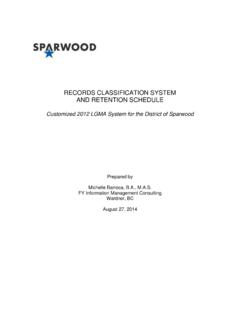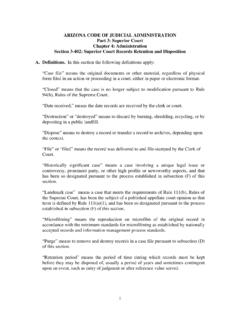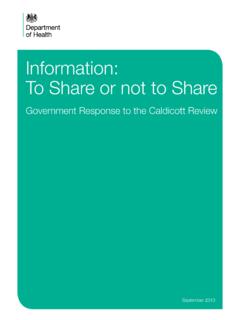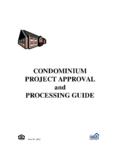Transcription of Guideline on the content, management and archiving of …
1 06 December 2018. EMA/INS/GCP/856758/2018. Good Clinical Practice Inspectors Working Group (GCP IWG). Guideline on the content , management and archiving of the clinical trial master file (paper and/or electronic). Draft adopted by GCP Inspectors Working Group (GCP IWG) 30 January 2017. Start of public consultation 12 April 2017. End of consultation (deadline for comments) 11 July 2017. Final revised document after comments received from public consultation 06 December 2018. adopted by GCP Inspectors Working Group (GCP IWG). Date of coming into effect 6 months after publication Keywords Trial master file, TMF, eTMF, essential documents, GCP inspection, archiving , scanning, retention , destruction 30 Churchill Place Canary Wharf London E14 5EU United Kingdom Telephone +44 (0)20 3660 6000 Facsimile +44 (0)20 3660 5555. Send a question via our website An agency of the European Union European Medicines Agency, 2018. Reproduction is authorised provided the source is acknowledged.
2 Guideline on the content , management and archiving of the clinical trial master file (paper and/or electronic). Table of contents 1. Executive 2. 3. Trial master file structure and contents ..4. Sponsor and investigator trial master file ..4. Contract research organisations ..4. Third parties-contracted by Trial master file Trial master file contents ..6. Essential Superseded Contemporariness of trial master 4. Security and control of trial master Access to trial master Storage areas for trial master file ..8. Sponsor/CRO electronic trial master Investigator electronic trial master file ..9. Quality of trial master 5. Scanning or transfers to other Certified copies ..11. Other copies ..12. Scanning or transfer to other media ..12. Validation of the digitisation and transfer process ..12. Destruction of original documents after digitisation and transfer ..12. 6. archiving and retention of trial master archiving of sponsor trial master file ..13. archiving of investigator/institution trial master file.
3 14. retention times of trial master archiving , retention and change of ownership/responsibility ..16. 7. 2. 1. Executive summary Trial master file (TMF) plays a key role in the successful management of a trial by the investigator/institutions and sponsors. The essential documents and data records stored in the TMF. enable the operational staff as well as monitors, auditors and inspectors to evaluate compliance with the protocol, the trial's safe conduct and the quality of the data obtained. This Guideline is intended to assist the sponsors and investigators/institutions in complying with the requirements of the current legislation (Directive 2001/20/EC and Directive 2005/28/EC), as well as ICH E6 Good Clinical Practice (GCP). Guideline ( ICH GCP Guideline '), regarding the structure, content , management and archiving of the clinical trial master file (TMF). The guidance also applies to the legal representatives and contract research organisation (CROs), which according to the ICH GCP Guideline includes any third party such as vendors and service providers to the extent of their assumed sponsor trial-related duties and functions.
4 The ICH GCP Guideline provides information in relation to essential documents to be collected during the conduct of a clinical trial. The risk-based approach to quality management also has an impact on the content of the TMF. To ensure continued guidance once the Clinical Trials Regulation (EU) No. 536/2014. ( Regulation') comes into application, this guidance already prospectively considers the specific requirements of the Regulation with respect to the TMF. 2. Introduction A TMF is the collection of essential documents that is used by sponsors, CROs and investigators/institutions for the management of the trial and by monitors, auditors and inspectors to review and verify whether the sponsor and the investigators/institutions have conducted the trial in line with the applicable regulatory requirements and the principles and standards of GCP. The legislation does not differentiate between paper and electronic TMFs (eTMFs). Therefore, all basic requirements are the same for both formats or when used in combination as a hybrid TMF.
5 Article 57 of the Clinical Trial Regulation states The clinical trial master file shall at all times contain the essential documents relating to that clinical trial . Article 20 of Directive 2005/28/EC and Article 58 of the Regulation also require that after archiving Any alteration to the content of the trial master file shall be traceable. The TMF should provide for document identification, version history, search and retrieval1; also, as stated in both Directive 2005/28/EC (Article 17) and the Regulation (Articles 57 and 58) it shall be archived in a way that ensures that it is readily available and directly accessible upon request, to the competent authorities of the Member States. Article 47 of the Regulation states that sponsors and investigator/institution shall take appropriate account of the ICH GCP Guideline and shall conduct the trial in accordance with GCP principles, two of which are: All clinical trial information should be recorded, handled, and stored in a way that allows its accurate reporting, interpretation and verification 2.
6 Systems with procedures that assure the quality of every aspect of the trial should be implemented. Aspects of the trial that are essential to ensure human subject protection and reliability of trial results should be the focus of such systems. 3. Documents and records containing information and data resultant from following the systems and procedures that assure the quality of every aspect of the trial and that, as per Article 16 of Directive 1 CPMP/ICH/135/95 2 CPMP/ICH/135/95 3 CPMP/ICH/135/95 3. 2005/28/EC and Article 57 of the Regulation, enable verification of the conduct of the trial and the quality of the data generated are considered to be essential documents and should be retained. The sponsor's and any CRO's quality management system should have procedures ( standard operating procedures (SOPs)) in place to manage all aspects of the TMF to assure that the TMF is complete, legible and accurate. The investigator/institution should also ensure the TMF is managed to achieve the same outcome.
7 The TMF documentation should be sufficient to adequately reconstruct the activities undertaken in conducting the trial, along with decisions and justifications made concerning the trial. Documents and records in the TMF should collectively permit confirmation of compliance with the protocol and GCP and the integrity of data collected without the need for additional explanation from the sponsor, CRO or investigator/institution staff. This document provides guidance for implementing and maintaining a TMF that complies with the regulatory requirements. 3. Trial master file structure and contents Sponsor and investigator trial master file The TMF is usually composed of a sponsor TMF, held by the sponsor organisation, and an investigator TMF held by the investigator/institution. The investigator TMF is often referred to as the investigator site file (ISF). The TMF for the trial, both of the sponsor and of the investigator/institution, should be established at the beginning of the trial.
8 There should only be one TMF for a clinical trial, comprising the sponsor and investigator parts. In organising the TMF, it is essential to segregate some documents that are generated and/or held by the sponsor only, from those that are generated and/or held by the investigator/institution only ( subject identification code list filed in the investigator TMF only and master randomisation list filed in the sponsor TMF only). The investigator/institution is responsible for all essential documents generated by the investigator/institution and should therefore have control of them at all times4. In cases in which the investigator is employed by an institution that is the trial sponsor, the sponsor may delegate the task for maintaining all or part of the sponsor TMF to the investigator. In this circumstance, it is possible to combine the delegated part of the sponsor TMF and investigator TMF. for that investigator/institution, which avoids the duplication of documentation; however, the responsibility for the sponsor TMF remains with the sponsor.
9 The same applies when the investigator and the sponsor are the same person. When there is co-sponsorship of a trial, there should be arrangements in place for the maintenance of the TMF based upon the responsibilities that each co- sponsor holds. Role-based permissions should be established for activities being undertaken, such as restricted access to files/documents ( randomisation codes and unblinded adverse event data). Contract research organisations The sponsor may choose to outsource duties and functions of the sponsor to a CRO. The sponsor remains responsible for the trial and will need to maintain oversight. Therefore, access to the CRO- maintained part of the sponsor TMF ( by remote access to an eTMF) or at least regular access to relevant documents from it will be necessary to fulfil these responsibilities effectively. In conducting contracted duties and functions, the CRO will be generating documentation that should reside in the TMF. The clinical trial contract/agreement and other documents and procedures agreed between all parties should outline the arrangements for the TMF in some detail, such as: 4 CPMP/ICH/135/95/ 4.
10 Which party holds the TMF (or which party holds which parts of the TMF when this is divided);. the structure and indexing of the TMF;. the access arrangements for the involved parties;. when an eTMF is being used, the details of the system and change control management ;. lists of applicable procedures to be followed and training requirements;. type of documents that each party should retain;. arrangements for managing correspondence;. how the TMF would be made available to the competent authorities;. arrangements for when the trial is completed (the CRO may archive the TMF [or parts thereof] on behalf of the sponsor); if there is a contractual arrangement for the CRO to transfer all essential documents they have generated to the sponsor for archiving , the arrangement should ensure the sponsor retains the full set of documents and makes it readily available and accessible for inspections (including inspections related to the CRO's duties and functions).
